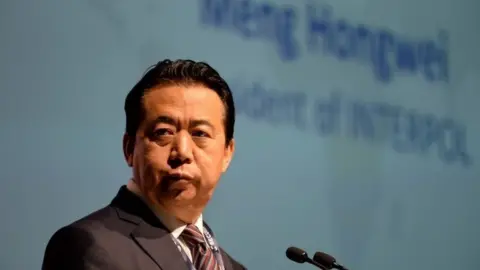Interpol urges China to clarify status of missing president Meng Hongwei
 AFP
AFPInternational police agency Interpol has urged China to clarify the status of its president, Meng Hongwei, who has gone missing on a visit to the country.
The agency said it was concerned about the well-being of its president.
His family have not heard from him since he left Interpol HQ in the French city of Lyon on 25 September. China has made no official comment.
The South China Morning Post quotes a source as saying Mr Meng, 64, was "taken away" for questioning in China.
It is not clear why he was being investigated by "discipline authorities" or where he was being held, the Hong Kong-based newspaper adds.
Earlier this week, actress Fan Bingbing, who disappeared in China in July, emerged with a public apology and a fine of 883 million yuan ($129m; £98.9m) for tax evasion and other offences.
What is the full Interpol statement?
Carried on the Interpol website and quoting secretary-general Juergen Stock, it says: "Interpol has requested through official law enforcement channels clarification from China's authorities on the status of President Meng Hongwei.
"Interpol's General Secretariat looks forward to an official response from China's authorities to address concerns over the president's well-being."
Mr Stock oversees the day-to-day work of the 192-member organisation, with the role of the president largely ceremonial.
Interpol co-ordinates searches among its members, issuing yellow notices for missing persons and a red notice - an international alert - for a wanted person. However, it does not have the power to send officers into countries to arrest individuals or issue arrest warrants.
Interpol had earlier said Mr Meng's case was "for the relevant authorities in both France and China". France has opened an investigation.
Who is Meng Hongwei?
 EPA
EPAHe was elected Interpol president in November 2016, the first Chinese to take up the post, and is scheduled to serve until 2020.
He heads the organisation's Executive Committee, which provides overall guidance and direction.
Before taking over at Interpol, Mr Meng was deputy minister in charge of public security in China and is still a senior Communist Party official.
He also has 40 years of experience in criminal justice and policing in China, notably in the fields of drugs, counter-terrorism and border control.
After his election human rights groups expressed concern that the move could help China pursue political dissidents who have fled the country.

Has Meng Hongwei angered China?
Analysis by BBC Asia Editor Celia Hatton
Meng Hongwei's disappearance seems to fit in with a now familiar pattern among China's senior Communist Party officials. The official in question suddenly drops out of the public eye and an alarm is raised that the person is "missing", usually by members of the public.
Eventually, the party issues a terse statement that the official is "under investigation", the official is then booted from the party for "disciplinary infractions" and - eventually - a prison sentence is announced. Since Xi Jinping came to power in 2012, well over a million party officials have been disciplined in some way.
Mr Meng's case is notable for a few reasons. First, his wife notified the French authorities after he had only been missing for a few days. Family members of missing party officials rarely, if ever, reach out to foreign authorities, for fear their relatives will face ever greater punishment.
Did the wife do this because she felt there was no other option? Also, at one time, China prized Mr Meng's lofty position at Interpol.
If he has really gone missing within the Chinese state apparatus, whom did he anger, or what could he have done for Beijing to willingly, and publicly, forfeit the top job at Interpol?

